一、介绍
1. 概念
OAuth开放授权是一个开放标准,允许用户授权第三方应用访问存储在另外的服务提供者上的信息,而不需要将用户名和密码提供给第三方应用或分享数据的内容,OAuth2.0是OAuth协议的延续版本,不向下兼容OAuth1.0.
2. 流程示例
允许将认证和授权的过程交由一个独立的第三方来进行担保,OAuth协议用来定义如何让第三方的担保有效且双方可信,以登录百度账号为例:
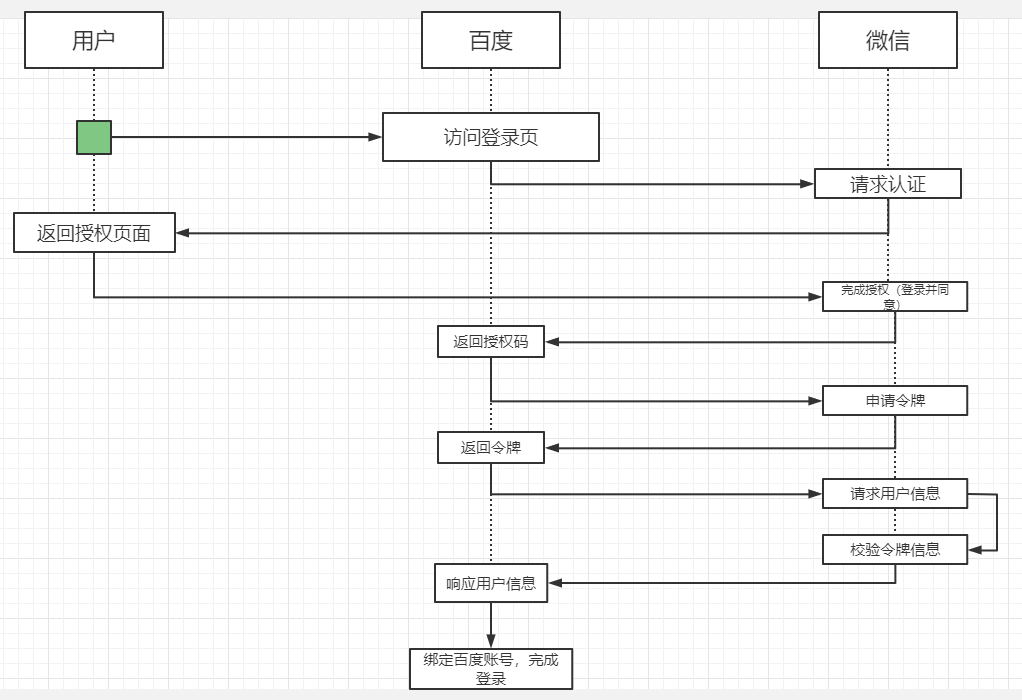
官方示意图:
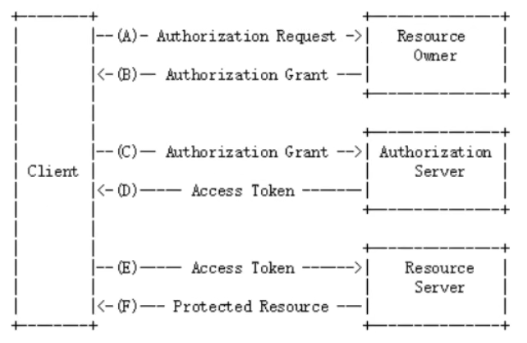
OAuth2.0包含以下几个角色:
客户端(示例中的浏览器、微信客户端)
本身不存储资源,需要通过资源拥有者的授权去请求资源服务器的资源
资源拥有者(示例中的用户)
通常是用户,也可以是应用程序,即该资源的拥有者
授权服务器(也称认证服务器)(示例中的微信)
用于服务提供者对资源资源拥有者的身份进行认证,对访问资源进行授权,认证成功后会给客户端发放令牌(access_token),作为客户端访问资源服务器的凭证
资源服务器(示例中的百度、微信)
存储资源的服务器,示例中,微信通过OAuth协议让百度可以访问自己存储的用户信息,而百度则通过该协议让用户可以访问自己受保护的资源
3. 补充
clientDetails(client_id):客户信息,代表百度在微信中的唯一索引
secret:密钥,百度获取微信信息时需要提供的一个加密字段
scope:授权作用域百度可以获取到的微信的信息范围,如:登录范围的凭证无法获取用户信息范围的内容
access_token:访问令牌,百度获取微信用户信息的凭证
grant_type:授权类型,authorization_code(授权码模式), password(密码模式), client_credentials(客户端模式), implicit(简易模式、隐式授权), refresh_token(刷新令牌)
userDetails(user_id):授权用户标识,示例中代表用户的微信号
二、Demo实现
OAuth2的服务包含授权服务(Authorization Server)和资源服务(Resource Server)。
授权服务
包含对接入端以及登入用户的合法性进行验证并颁发token等功能,对令牌的请求断点由SpringMVC控制器进行实现
- AuthorizationEndPoint服务用于认证请求,默认url:/oauth/authorize
- TokenEndPoint用于访问令牌的请求,默认url:/oauth/token
- OAuth2AuthenticaionProcessingFilter用于对请求给出的身份令牌进行解析健全
大致业务流程:
- 客户请求授权服务器申请access_token
- 客户携带申请到的access_token访问资源服务器中的资源信息
- 资源服务器将检验access_token的合法性,验证合法后返回对应的资源信息
1. 父工程搭建
pom.xml
<?xml version="1.0" encoding="UTF-8"?>
<project xmlns="http://maven.apache.org/POM/4.0.0"
xmlns:xsi="http://www.w3.org/2001/XMLSchema-instance"
xsi:schemaLocation="http://maven.apache.org/POM/4.0.0 http://maven.apache.org/xsd/maven-4.0.0.xsd">
<modelVersion>4.0.0</modelVersion>
<modules>
<module>OAuth-Server</module>
<module>OAuth-User</module>
</modules>
<parent>
<groupId>org.springframework.boot</groupId>
<artifactId>spring-boot-starter-parent</artifactId>
<version>2.2.5.RELEASE</version>
<relativePath/>
</parent>
<groupId>com.sw</groupId>
<artifactId>Spring-Cloud-OAuth2</artifactId>
<version>1.0.0-SNAPSHOT</version>
<packaging>pom</packaging>
<properties>
<java.version>1.8</java.version>
<project.build.sourceEncoding>UTF-8</project.build.sourceEncoding>
<springboot.version>2.2.5.RELEASE</springboot.version>
</properties>
<dependencyManagement>
<dependencies>
<dependency>
<groupId>org.springframework.boot</groupId>
<artifactId>spring-boot-starter-web</artifactId>
<version>${springboot.version}</version>
</dependency>
<dependency>
<groupId>org.springframework.cloud</groupId>
<artifactId>spring-cloud-starter-security</artifactId>
<version>${springboot.version}</version>
</dependency>
<dependency>
<groupId>org.springframework.cloud</groupId>
<artifactId>spring-cloud-starter-oauth2</artifactId>
<version>${springboot.version}</version>
</dependency>
<dependency>
<groupId>org.springframework.security</groupId>
<artifactId>spring-security-jwt</artifactId>
<version>1.0.9.RELEASE</version>
</dependency>
<dependency>
<groupId>org.springframework.boot</groupId>
<artifactId>spring-boot-starter-data-redis</artifactId>
<version>${springboot.version}</version>
</dependency>
<dependency>
<groupId>org.springframework.boot</groupId>
<artifactId>spring-boot-starter-actuator</artifactId>
<version>${springboot.version}</version>
</dependency>
<dependency>
<groupId>javax.interceptor</groupId>
<artifactId>javax.interceptor-api</artifactId>
<version>1.2.2</version>
</dependency>
<dependency>
<groupId>mysql</groupId>
<artifactId>mysql-connector-java</artifactId>
<scope>8.0.18</scope>
</dependency>
<dependency>
<groupId>org.projectlombok</groupId>
<artifactId>lombok</artifactId>
<version>1.18.20</version>
</dependency>
</dependencies>
</dependencyManagement>
</project>2. 授权服务
pom.xml
<?xml version="1.0" encoding="UTF-8"?>
<project xmlns="http://maven.apache.org/POM/4.0.0"
xmlns:xsi="http://www.w3.org/2001/XMLSchema-instance"
xsi:schemaLocation="http://maven.apache.org/POM/4.0.0 http://maven.apache.org/xsd/maven-4.0.0.xsd">
<parent>
<artifactId>Spring-Cloud-OAuth2</artifactId>
<groupId>com.sw</groupId>
<version>1.0.0-SNAPSHOT</version>
</parent>
<modelVersion>4.0.0</modelVersion>
<artifactId>OAuth-Server</artifactId>
<dependencies>
<dependency>
<groupId>org.springframework.boot</groupId>
<artifactId>spring-boot-starter-web</artifactId>
</dependency>
<dependency>
<groupId>org.springframework.cloud</groupId>
<artifactId>spring-cloud-starter-security</artifactId>
</dependency>
<dependency>
<groupId>org.springframework.cloud</groupId>
<artifactId>spring-cloud-starter-oauth2</artifactId>
</dependency>
<dependency>
<groupId>org.springframework.security</groupId>
<artifactId>spring-security-jwt</artifactId>
</dependency>
</dependencies>
</project>主启动类
开启 @EnableAuthorizationServer 注解
package com.sw.oauth.server;
import org.springframework.boot.SpringApplication;
import org.springframework.boot.autoconfigure.SpringBootApplication;
import org.springframework.security.oauth2.config.annotation.web.configuration.EnableAuthorizationServer;
/**
* @author suaxi
* @date 2022/2/14 22:01
*/
@SpringBootApplication
@EnableAuthorizationServer
public class OAuthServerApplication {
public static void main(String[] args) {
SpringApplication.run(OAuthServerApplication.class, args);
}
}
application.yam
server:
port: 8088
spring:
application:
name: OAuth-Server配置AuthorizationConfig
package com.sw.oauth.server.config;
import org.springframework.beans.factory.annotation.Autowired;
import org.springframework.context.annotation.Bean;
import org.springframework.context.annotation.Configuration;
import org.springframework.http.HttpMethod;
import org.springframework.security.authentication.AuthenticationManager;
import org.springframework.security.core.userdetails.UserDetailsService;
import org.springframework.security.crypto.bcrypt.BCryptPasswordEncoder;
import org.springframework.security.oauth2.config.annotation.configurers.ClientDetailsServiceConfigurer;
import org.springframework.security.oauth2.config.annotation.web.configuration.AuthorizationServerConfigurerAdapter;
import org.springframework.security.oauth2.config.annotation.web.configurers.AuthorizationServerEndpointsConfigurer;
import org.springframework.security.oauth2.config.annotation.web.configurers.AuthorizationServerSecurityConfigurer;
import org.springframework.security.oauth2.provider.ClientDetailsService;
import org.springframework.security.oauth2.provider.code.AuthorizationCodeServices;
import org.springframework.security.oauth2.provider.code.InMemoryAuthorizationCodeServices;
import org.springframework.security.oauth2.provider.token.AuthorizationServerTokenServices;
import org.springframework.security.oauth2.provider.token.DefaultTokenServices;
import org.springframework.security.oauth2.provider.token.TokenStore;
/**
* @author suaxi
* @date 2022/2/14 22:11
*/
@Configuration
public class AuthorizationConfig extends AuthorizationServerConfigurerAdapter {
@Autowired
private AuthorizationCodeServices authorizationCodeServices;
@Autowired
private AuthenticationManager authenticationManager;
@Autowired
private UserDetailsService userDetailsService;
@Autowired
private TokenStore tokenStore;
@Autowired
private ClientDetailsService clientDetailsService;
/**
* 3.令牌端点安全约束
* @param security
* @throws Exception
*/
@Override
public void configure(AuthorizationServerSecurityConfigurer security) throws Exception {
security
//oauth/token_key 公开
.tokenKeyAccess("permitAll()")
//oauth/check_token 公开
.checkTokenAccess("permitAll()")
//表单认证,申请令牌
.allowFormAuthenticationForClients();
}
/**
* 1.客户端详情
* @param clients
* @throws Exception
*/
@Override
public void configure(ClientDetailsServiceConfigurer clients) throws Exception {
clients.inMemory()
//clientId
.withClient("c1")
//客户端密钥
.secret(new BCryptPasswordEncoder().encode("secret"))
//资源列表
.resourceIds("admin")
//授权方式
.authorizedGrantTypes("authorization_code", "password", "client_credentials", "implicit", "refresh_token")
//授权范围
.scopes("all")
//跳转到授权页面
.autoApprove(false)
//回调地址
.redirectUris("https://wangchouchou.com");
}
/**
* 2.令牌服务
* @param endpoints
* @throws Exception
*/
@Override
public void configure(AuthorizationServerEndpointsConfigurer endpoints) throws Exception {
endpoints
//认证管理器
.authenticationManager(authenticationManager)
//密码模式的用户信息管理
.userDetailsService(userDetailsService)
//授权码服务
.authorizationCodeServices(authorizationCodeServices)
//令牌管理服务
.tokenServices(tokenServices())
.allowedTokenEndpointRequestMethods(HttpMethod.POST);
}
public AuthorizationServerTokenServices tokenServices() {
DefaultTokenServices tokenServices = new DefaultTokenServices();
//客户端详情
tokenServices.setClientDetailsService(clientDetailsService);
//允许令牌自动刷新
tokenServices.setSupportRefreshToken(true);
//令牌存储策略
tokenServices.setTokenStore(tokenStore);
//默认令牌有效期
tokenServices.setAccessTokenValiditySeconds(3600);
//刷新令牌有效期
tokenServices.setRefreshTokenValiditySeconds(86400);
return tokenServices;
}
/**
* 授权码模式的授权码如何存取
* @return
*/
@Bean
public AuthorizationCodeServices authorizationCodeServices() {
return new InMemoryAuthorizationCodeServices();
}
}
ClientDetailsServiceConfigurer:配置客户端详情(ClientDetails)服务,客户端详情信息在这里进行初始化,此处以内存配置方式为例
- clientId:用于标识客户的id
- secret:客户端安全码
- scope:客户端访问范围,如果为空,则代表拥有全部的访问范围
- authorizedGrantTypes:授权类型
- authorities:客户端拥有的权限
- redirectUris:回调地址,授权服务会往该地址推送客户端相关的信息
AuthorizationServerEndpointsConfigurer:配置令牌(token)的访问端点和令牌服务(tokenService),它可以完成令牌服务和令牌服务各个端点配置
- authenticationManager:认证管理器,选择password认证模式时就需要指定authenticationManager对象来进行鉴权
- userDetailsService:用户主体管理服务,如果设置这个属性,需要实现UserDetailsService接口,也可以设置全局域(GlobalAuthenticationManagerConfigurer),如果配置这种方式,refresh_token刷新令牌方式的授权流程中会多一个检查步骤,来确保当前令牌是否仍然有效
- authorizationCodeServices:用于授权码模式
- implicitGrantService:用于设置隐式授权模式的状态
- tokenGranter:如果设置该属性,授权全部交由自己掌控,并会忽略以上已设置的属性
AuthorizationServerSecurityConfigurer:配置令牌端点的安全约束,可以通过pathMapping()方法配置端点url的链接地址,替换oauth默认的授权地址,也可以跟换spring security默认的授权页面
- /oauth/authorize:授权端点
- /oauth/token:令牌端点
- /oauth/confirm_access:用户确认授权提交端点
- /oauth/error:授权服务错误信息端点
- /oauth/check_token:检查令牌
- /oauth/token_key:使用jwt令牌需要用到的提供公有密钥的端点
配置TokenConfig
package com.sw.oauth.server.config;
import org.springframework.context.annotation.Bean;
import org.springframework.context.annotation.Configuration;
import org.springframework.security.oauth2.provider.token.TokenStore;
import org.springframework.security.oauth2.provider.token.store.InMemoryTokenStore;
/**
* @author suaxi
* @date 2022/2/14 22:24
*/
@Configuration
public class TokenConfig {
@Bean
public TokenStore tokenStore() {
return new InMemoryTokenStore();
}
}
实现AuthorizationServerTokenService需要继承DefaultTokenService,该类可以修改令牌的格式和存储,默认情况下,在创建令牌时使用随机字符串来填充,这个类完成了令牌管理的大部分事情,唯一需要依赖的是spring容器中的TokenStore接口,以此来定制令牌持久化;TokenStore有一个默认实现(InMemoryTokenStore),这个实现类将令牌保存到内存中,除此之外还有其他几个默认实现类:
- InMemoryTokenStore:默认采用方式,可在单节点运行(即并发压力不大的情况下,并且在失败时不会进行备份),也可以在并发的时候进行管理,因为数据保存在内存中,不进行持久化存储,易于调试
- JdbcTokenStore:基于JDBC的实现类,令牌会被保存到关系型数据库中,可在不同的服务器之间共享令牌信息
- RedisTokenStore:与jdbc方式类似
- JwtTokenStore(JSON Web Token):可以将令牌信息全部编码整合进令牌本身,优点是后端可以不用进行存储操作,缺点是撤销一个已经授权的令牌很困难,所以通常用来处理生命周期较短的令牌以及撤销刷新令牌,另一个缺点是令牌较长,包含的用户凭证信息,它不保存任何数据在转换令牌值和授权信息方面与DefaultTokenServices扮演一样的角色
配置WebSecurityConfig
package com.sw.oauth.server.config;
import org.springframework.context.annotation.Bean;
import org.springframework.context.annotation.Configuration;
import org.springframework.security.authentication.AuthenticationManager;
import org.springframework.security.config.annotation.method.configuration.EnableGlobalMethodSecurity;
import org.springframework.security.config.annotation.web.builders.HttpSecurity;
import org.springframework.security.config.annotation.web.configuration.WebSecurityConfigurerAdapter;
import org.springframework.security.core.userdetails.User;
import org.springframework.security.core.userdetails.UserDetailsService;
import org.springframework.security.crypto.bcrypt.BCryptPasswordEncoder;
import org.springframework.security.crypto.password.PasswordEncoder;
import org.springframework.security.provisioning.InMemoryUserDetailsManager;
/**
* @author suaxi
* @date 2022/2/14 22:25
*/
@Configuration
@EnableGlobalMethodSecurity(prePostEnabled = true, securedEnabled = true)
public class WebSecurityConfig extends WebSecurityConfigurerAdapter {
@Bean
public PasswordEncoder passwordEncoder() {
return new BCryptPasswordEncoder();
}
@Bean
@Override
public AuthenticationManager authenticationManagerBean() throws Exception{
return super.authenticationManager();
}
@Bean
@Override
public UserDetailsService userDetailsService() {
InMemoryUserDetailsManager inMemoryUserDetailsManager = new InMemoryUserDetailsManager(
User.withUsername("admin").password(passwordEncoder().encode("123456")).authorities("manager, worker").build(),
User.withUsername("manager").password(passwordEncoder().encode("123456")).authorities("manager").build(),
User.withUsername("worker").password(passwordEncoder().encode("123456")).authorities("worker").build()
);
return inMemoryUserDetailsManager;
}
@Override
protected void configure(HttpSecurity http) throws Exception {
http.csrf().disable()
.authorizeRequests()
.anyRequest().authenticated()
.and()
.formLogin();
}
}
3. 授权服务流程测试
1. 客户端模式client_credentails

客户端向授权服务器发送自己的身份信息,请求access_token
localhost:8088/oauth/token参数列表:
- grant_type:授权类型,需填写client_credentials
- client_id:客户端标识
- client_secret:客户端密钥
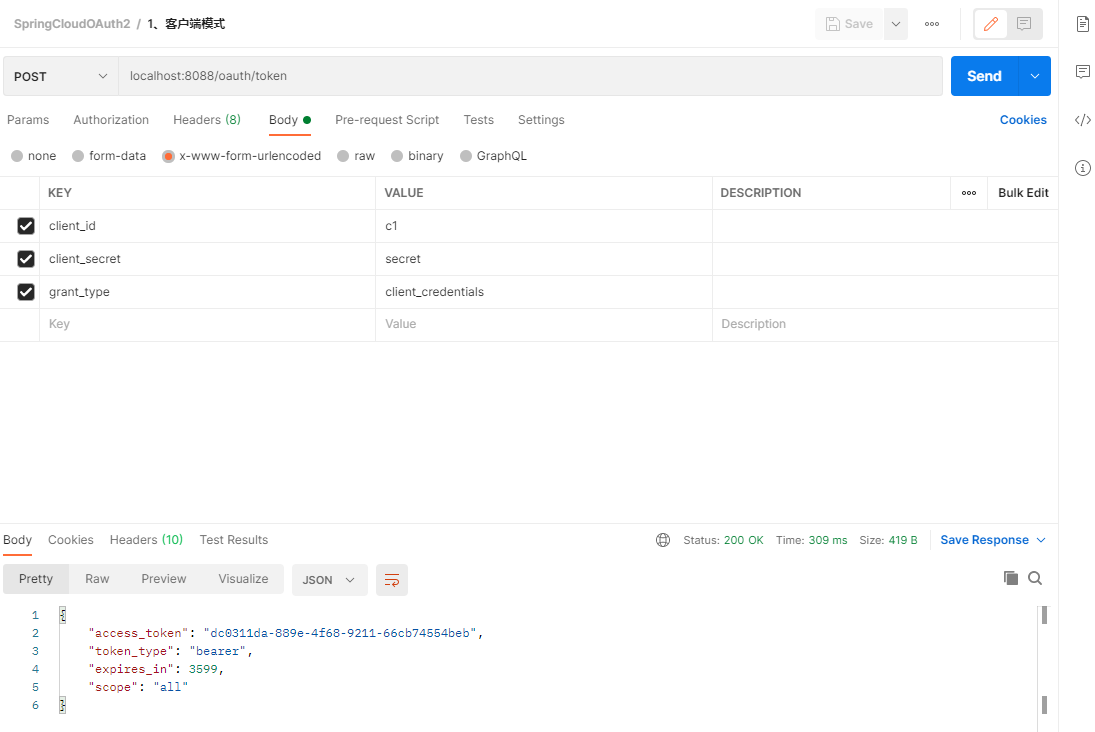
这种方式最方便但也是最不安全的,代表了授权服务器对客户端完全信任,一般用于授权服务器对客户端完全信任的场景。
2. 密码模式password
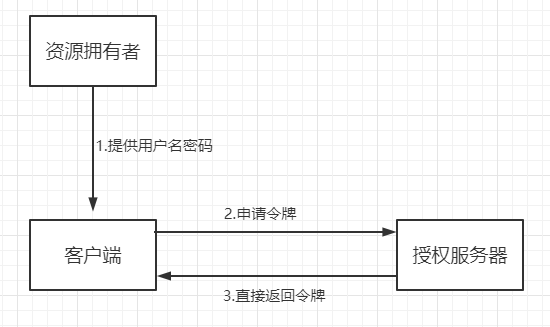
(1)资源拥有者将用户名、密码发送给客户端
(2)客户端用资源拥有者的用户名、密码向授权服务器申请令牌
localhost:8088/oauth/token参数列表:
- grant_type:授权类型,需填写password
- client_id:客户端标识
- client_secret:客户端密钥
- username:用户名
- password:密码
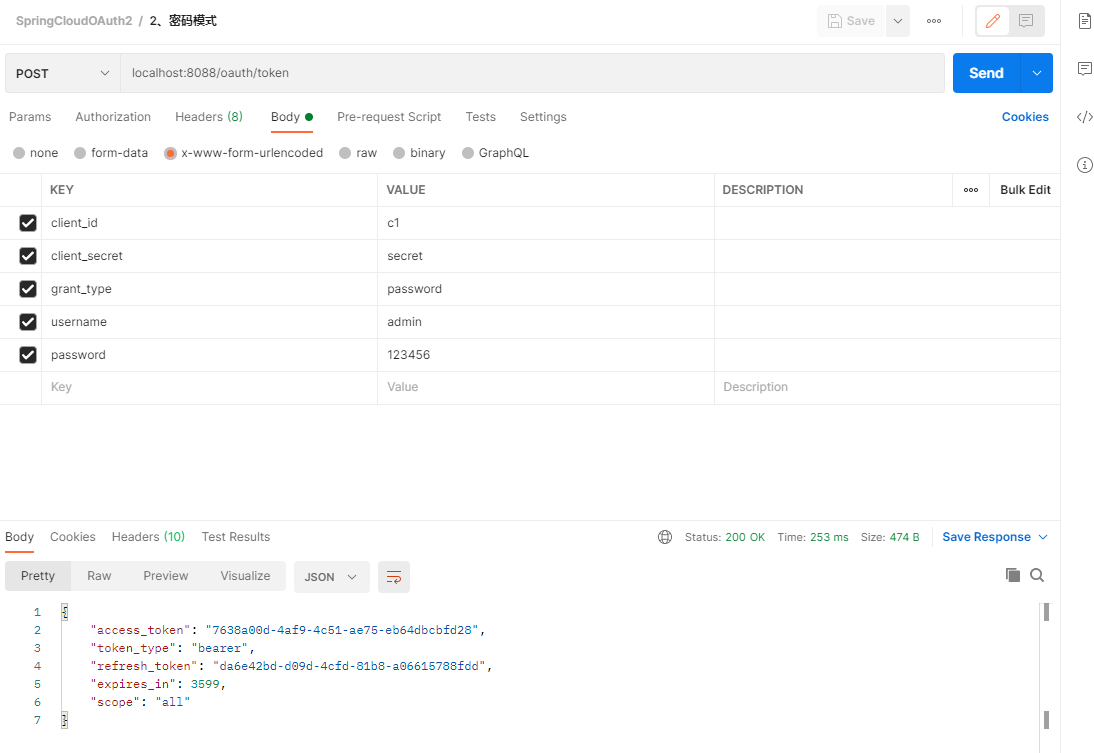
这种方式用户会把用户名、密码直接泄露给客户端,代表了资源拥有者和授权服务器对客户端的绝对互信,一般用于内部开发客户端的场景
3.简化模式(隐式模式)implicit
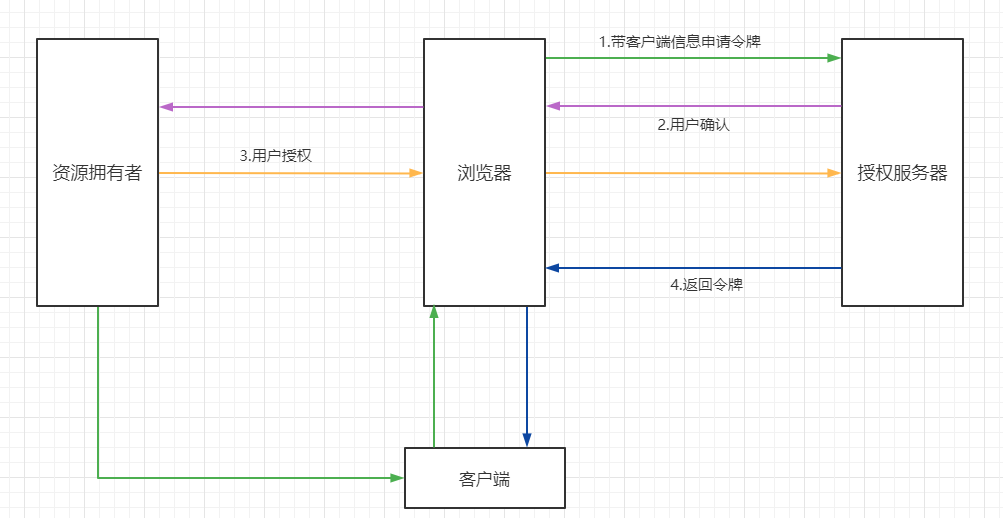
(1)用户访问客户端,客户端向授权服务器申请授权
(2)授权服务器引导用户进入授权页面,待用户同意授权
(3)用户同意授权
(4)用户同意授权后,授权服务器向客户端返回令牌
测试流程:
(1)客户端引导用户,直接访问授权服务器的授权地址
http://localhost:8088/oauth/authorize?client_id=c1&response_type=token&scope=all&redirect_uri=https://wangchouchou.com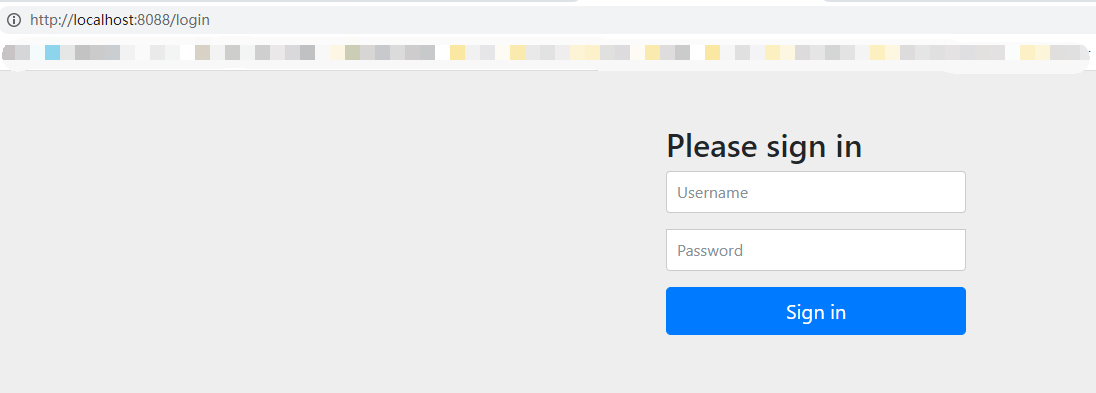
(2)用户登录之后跳转至授权页面

(3)用户点击approve同意授权,提交之后,页面跳转至redirect_uri地址并携带令牌信息(该地址需授权服务器提前配置)

一般情况下,redirect_uri会配置成客户端自己的一个响应地址,这个地址收到授权服务器推送过来的令牌之后,可将它保存至本地,在需要调用资源服务时,再拿出来携带上访问资源服务器。该模式下,access_token是以#gragement的方式返回的,oauth三方的数据已经进行了隔离,一般用于没有服务端的第三方单页面应用,可在js中直接相应access_token。
4. 授权码模式 authorization_code
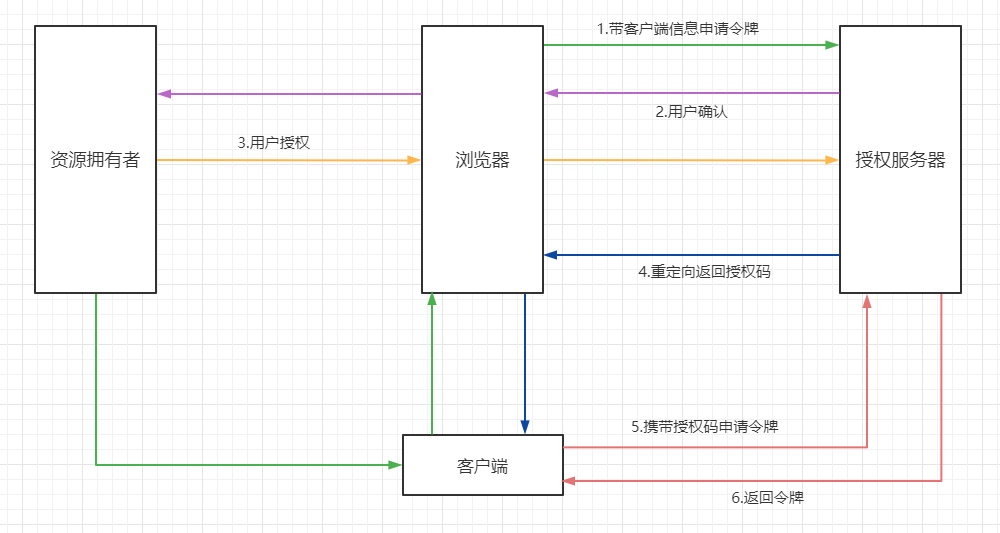
相较于简化模式的流程,授权码模式在第四步时,授权服务器先给客户端返回一个授权码(authorization_code),客户端拿到之后,再向授权服务器申请令牌
测试流程:
(1)用户申请access_token时访问:
http://localhost:8088/oauth/authorize?client_id=c1&response_type=code&scope=all&redirect_uri=https://wangchouchou.com首先会跳转到授权服务器登录页,用户进行登录
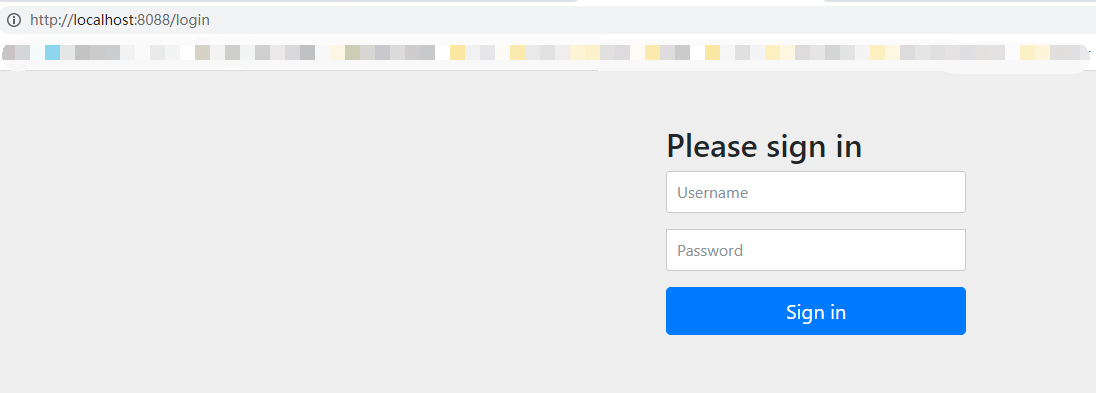
(2)登录完成之后,转到授权页面

(3)点击同意授权之后,携带授权码重定向至redirect_uri

(4)申请令牌
参数列表:
- grant_type:授权类型,需填写authorization_code
- client_id:客户端标识
- client_secret:客户端密钥
- code:授权码(只能用一次)
- redirect_uri:重定向地址
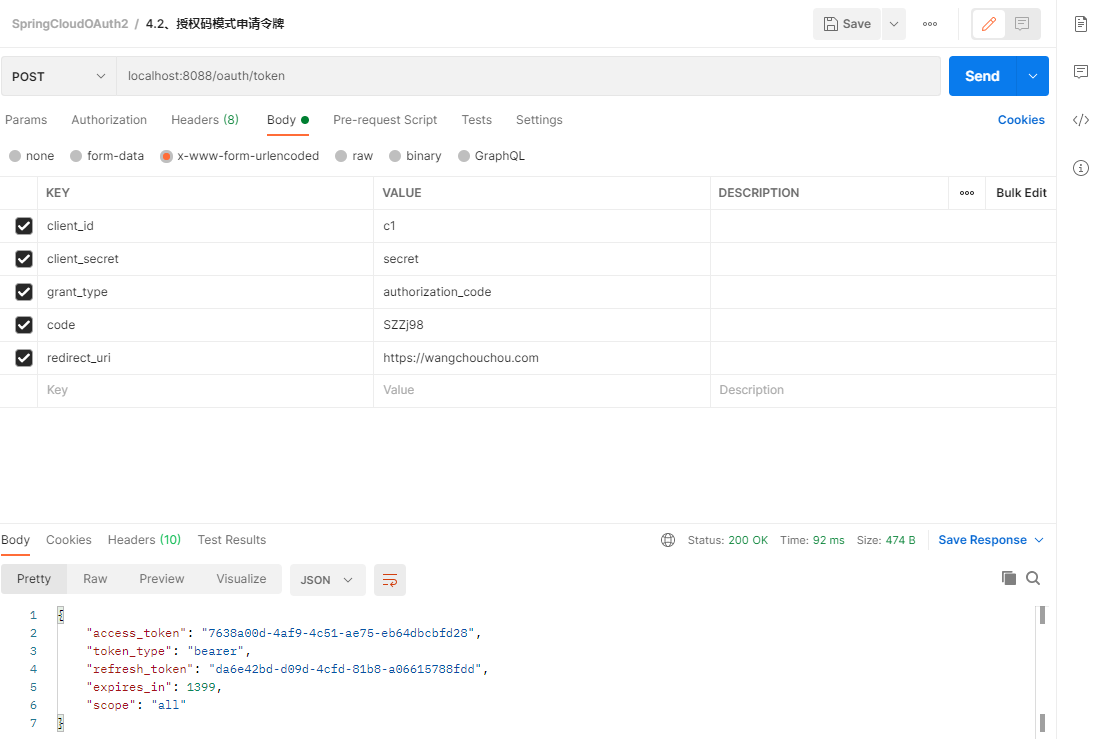
5. 刷新令牌
当令牌超时后,可以通过refresh_token申请新的令牌(refresh_token随access_token一起申请到)
参数列表:
- grant_type:授权类型,需填写refresh_token
- client_id:客户端标识
- client_secret:客户端密钥
- refresh_token:刷新令牌
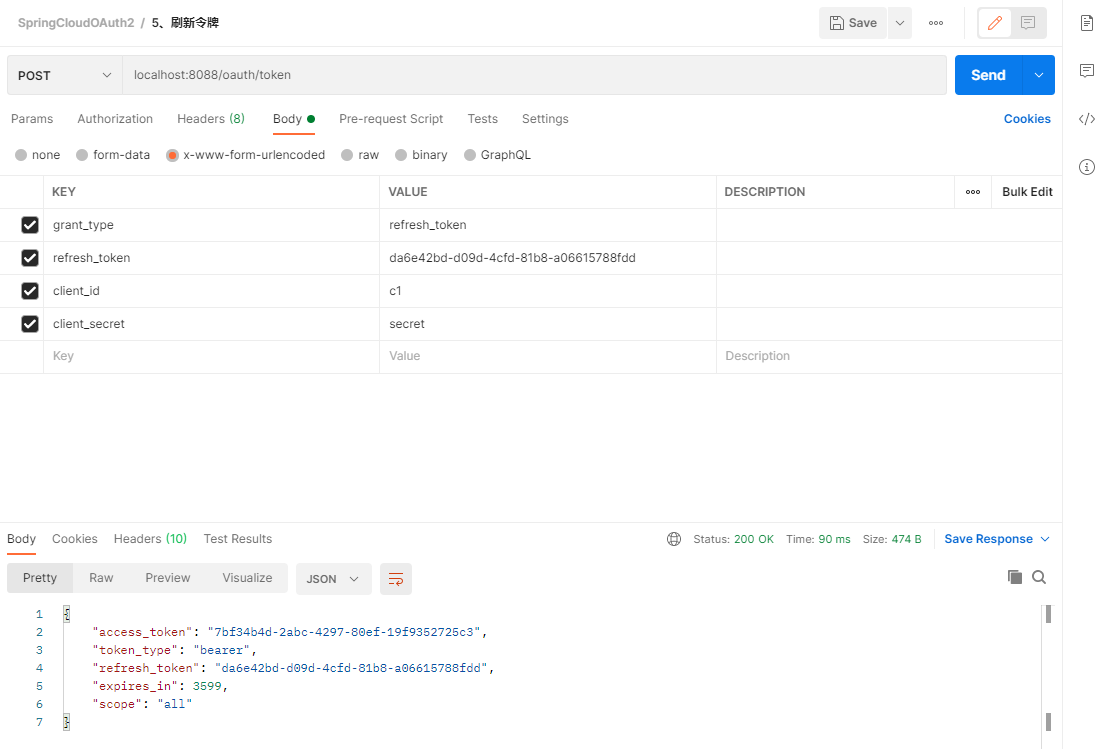
6. 验证令牌
参数列表:
- token:令牌
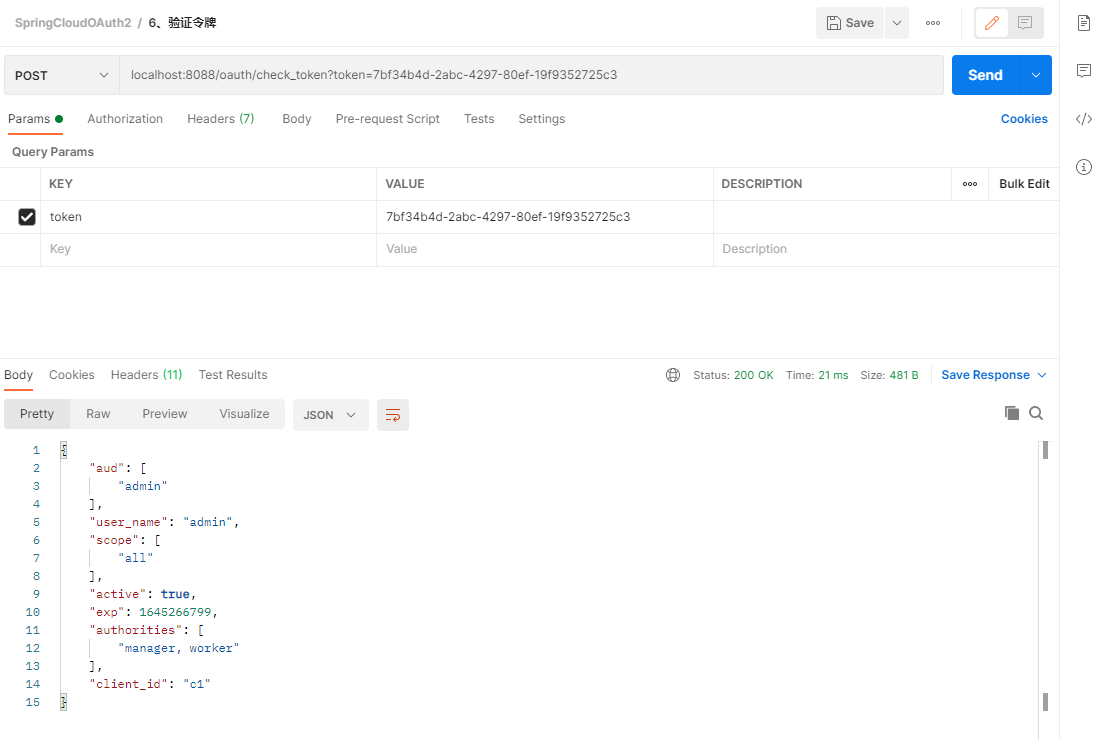
4. 资源服务
pom.xml
<?xml version="1.0" encoding="UTF-8"?>
<project xmlns="http://maven.apache.org/POM/4.0.0"
xmlns:xsi="http://www.w3.org/2001/XMLSchema-instance"
xsi:schemaLocation="http://maven.apache.org/POM/4.0.0 http://maven.apache.org/xsd/maven-4.0.0.xsd">
<parent>
<artifactId>Spring-Cloud-OAuth2</artifactId>
<groupId>com.sw</groupId>
<version>1.0.0-SNAPSHOT</version>
</parent>
<modelVersion>4.0.0</modelVersion>
<artifactId>OAuth-User</artifactId>
<dependencies>
<dependency>
<groupId>org.springframework.boot</groupId>
<artifactId>spring-boot-starter-web</artifactId>
</dependency>
<dependency>
<groupId>org.springframework.cloud</groupId>
<artifactId>spring-cloud-starter-security</artifactId>
</dependency>
<dependency>
<groupId>org.springframework.cloud</groupId>
<artifactId>spring-cloud-starter-oauth2</artifactId>
</dependency>
<dependency>
<groupId>org.springframework.security</groupId>
<artifactId>spring-security-jwt</artifactId>
</dependency>
</dependencies>
</project>主启动类
打开@EnableResourceServer注解,会自动增加一个OAuth2AuthenticationProcessingFilter的过滤器链
package com.sw.oauth.user;
import org.springframework.boot.SpringApplication;
import org.springframework.boot.autoconfigure.SpringBootApplication;
import org.springframework.security.oauth2.config.annotation.web.configuration.EnableResourceServer;
/**
* @author suaxi
* @date 2022/2/14 22:08
*/
@SpringBootApplication
@EnableResourceServer
public class OAuthUserApplication {
public static void main(String[] args) {
SpringApplication.run(OAuthUserApplication.class, args);
}
}
application.yml
server:
port: 8089
spring:
application:
name: OAuth-User资源服务器核心配置
Spring Security也提供了ResourceServerSecurityConfigurer适配器来协助完成资源服务器的配置
ResourceServerSecurityConfigurer中主要包含:
- tokenServices:ResourceServerTokenServices类的实例,用来实现令牌服务,即如何验证令牌
- tokenStore:TokenStore类的实例,指定令牌如何访问,与tokenServices配置可选
- resourceId:资源服务器id(可选),一般情况下推荐设置并在授权服务中进行验证
- tokenExtractor:用于提取请求中的令牌
HttpSecurity配置与Spring Security类似:
- authorizeRequests()方法验证请求
- antMatchers()方法匹配访问路径
- access()方法配置需要的权限
ResourceServerConfig配置
package com.sw.oauth.user.config;
import org.springframework.beans.factory.annotation.Autowired;
import org.springframework.context.annotation.Configuration;
import org.springframework.security.config.annotation.web.builders.HttpSecurity;
import org.springframework.security.config.http.SessionCreationPolicy;
import org.springframework.security.oauth2.config.annotation.web.configuration.ResourceServerConfigurerAdapter;
import org.springframework.security.oauth2.config.annotation.web.configurers.ResourceServerSecurityConfigurer;
import org.springframework.security.oauth2.provider.token.RemoteTokenServices;
import org.springframework.security.oauth2.provider.token.ResourceServerTokenServices;
import org.springframework.security.oauth2.provider.token.TokenStore;
/**
* @author suaxi
* @date 2022/2/15 22:36
*/
@Configuration
public class ResourceServerConfig extends ResourceServerConfigurerAdapter {
private static final String RESOURCE_ADMIN = "admin";
@Autowired
private TokenStore tokenStore;
@Override
public void configure(ResourceServerSecurityConfigurer resources) throws Exception {
resources
//资源ID
.resourceId(RESOURCE_ADMIN)
//使用远程服务验证令牌(使用JWT令牌时无需远程验证服务)
.tokenServices(tokenServices())
.tokenStore(tokenStore)
//无状态模式(无需管理session,此处只验证access_token)
.stateless(true);
}
@Override
public void configure(HttpSecurity http) throws Exception {
http.authorizeRequests()
.antMatchers("/admin/**")
.access("#oauth2.hasAnyScope('all')")
.and()
.csrf().disable()
.sessionManagement().sessionCreationPolicy(SessionCreationPolicy.STATELESS);
}
/**
* access_token远程验证策略
* @return
*/
public ResourceServerTokenServices tokenServices() {
RemoteTokenServices tokenServices = new RemoteTokenServices();
tokenServices.setCheckTokenEndpointUrl("http://localhost:8088/oauth/check_token");
tokenServices.setClientId("c1");
tokenServices.setClientSecret("secret");
return tokenServices;
}
}
需注意ResourceServerSecurityConfigurer的tokenServices()方法,设置了一个token的管理服务,其中,如果资源服务和授权服务在同一应用程序上,那可以使用DefaultTokenServices,就不用考虑实现所有必要接口一致性的问题,反之,则必须要保证有能够匹配授权服务提供的ResourceServerTokenServices,这个类知道如何对令牌进行解码。
令牌解析方法:使用DefaultTokenServices在资源服务器本地配置令牌存储、解码、解析方式;使用RemoteTokenServices,资源服务器通过http请求来解码令牌,每次请求都需要请求授权服务器端点/oauth/check_token,同时还需要授权服务器将该端点暴露出来,以便资源服务器进行访问,在资源服务器配置中需注意:
@Override
public void configure(AuthorizationServerSecurityConfigurer security) throws Exception {
security
//oauth/token_key 公开
.tokenKeyAccess("permitAll()")
//oauth/check_token 公开
.checkTokenAccess("permitAll()")
//表单认证,申请令牌
.allowFormAuthenticationForClients();
}资源服务器WebSecurityConfig配置
package com.sw.oauth.user.config;
import org.springframework.context.annotation.Configuration;
import org.springframework.security.config.annotation.web.builders.HttpSecurity;
import org.springframework.security.config.annotation.web.configuration.WebSecurityConfigurerAdapter;
/**
* @author suaxi
* @date 2022/2/15 22:52
*/
@Configuration
public class WebSecurityConfig extends WebSecurityConfigurerAdapter {
@Override
protected void configure(HttpSecurity http) throws Exception {
http.csrf().disable()
.authorizeRequests()
.antMatchers("/admin/**")
.hasAnyAuthority("admin")
.anyRequest().authenticated();
}
}
controller
package com.sw.oauth.user.controller;
import org.springframework.web.bind.annotation.GetMapping;
import org.springframework.web.bind.annotation.RequestMapping;
import org.springframework.web.bind.annotation.RestController;
/**
* @author suaxi
* @date 2022/2/15 22:43
*/
@RestController
@RequestMapping("/admin")
public class AdminController {
@GetMapping("/test")
public String test() {
return "test";
}
}
接口测试:
直接访问:
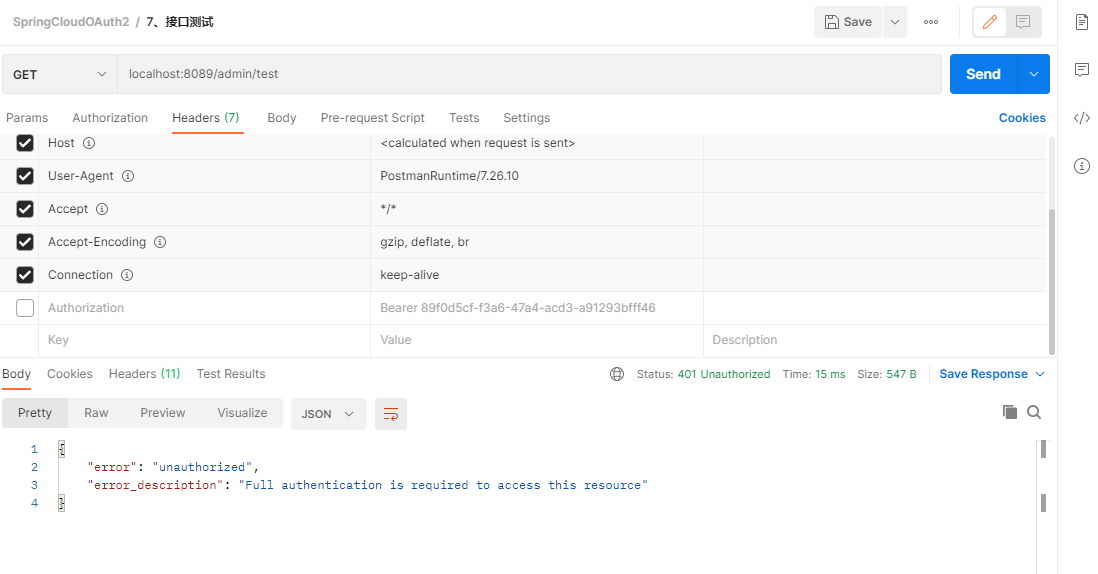
header携带令牌访问:
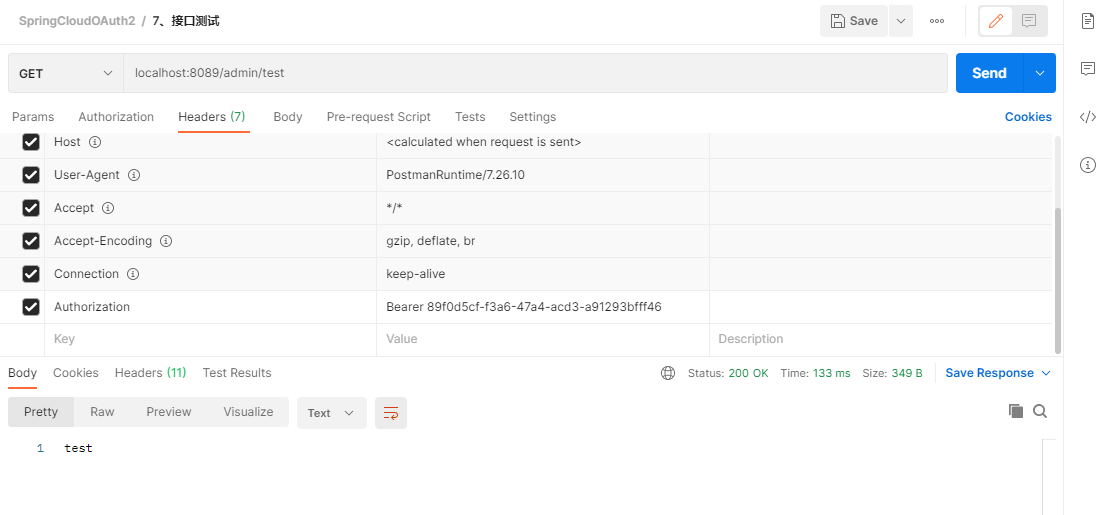
在该测试过程中,资源服务器未配置TokenStore对象,它并不知道access_token的意义;需要使用RemoteTokenServices将令牌拿到授权服务器上进行验证才能得到客户信息,当请求量逐步增大之后,会加重系统的网络负担以及运行效率,而JWT令牌需解决以上提到的问题。
三、 JWT令牌
1. 概念
JWT(JSON Web Token),是一个开放的行业标准(RFC 7519),它定义了一种简单的、自包含的协议格式,用于在通信双方传递json对象,传递的信息经过数字签名,可以被验证和信任,可以使用HMAC、RSA等算法。在OAuth中使用JWT,令牌本身就包含了客户的详细信息,资源服务器就不用再依赖授权服务器就可以完成令牌解析。
RFC 7519协议:https://datatracker.ietf.org/doc/rfc7519/
优点
- 基于json,方便解析
- 自定义令牌内容,可扩展
- 通过非对称加密算法及数字签名防止被篡改,安全性高
- 资源服务器克不依赖于授权服务器完成令牌解析
缺点:令牌较长,占用的空间过多
令牌结构
由Header.Payload.Signature三部分组成,中间由(.)分割
Header:
头部包括令牌的类型以及使用的hash算法(HMAC、SHA256、RSA)
{
"alg": "HS256",
"typ": "JWT"
}使用Base64编码之后得到JWT令牌的第一部分
Payload:
负载(Base64编码):存放有效信息,如:iss(签发者),exp(过期时间戳),sub(面向的用户)等,也可以自定义字段
该部分不建议存放敏感信息,可以通过解码还原出原始内容。
Signature:
该部分防止JWT内容被篡改,使用Base64将前两部分编码,使用(.)连接组成字符串,最后使用header中声明的算法进行签名
2. 配置JWT令牌服务
1. 授权服务配置
TokenConfig配置
package com.sw.oauth.server.config;
import org.springframework.context.annotation.Bean;
import org.springframework.context.annotation.Configuration;
import org.springframework.security.oauth2.provider.token.TokenStore;
import org.springframework.security.oauth2.provider.token.store.InMemoryTokenStore;
import org.springframework.security.oauth2.provider.token.store.JwtAccessTokenConverter;
import org.springframework.security.oauth2.provider.token.store.JwtTokenStore;
/**
* @author suaxi
* @date 2022/2/14 22:24
*/
@Configuration
public class TokenConfig {
private static final String SIGN_KEY = "server";
// @Bean
// public TokenStore tokenStore() {
// return new InMemoryTokenStore();
// }
@Bean
public TokenStore tokenStore() {
return new JwtTokenStore(accessTokenConverter());
}
@Bean
public JwtAccessTokenConverter accessTokenConverter() {
JwtAccessTokenConverter accessTokenConverter = new JwtAccessTokenConverter();
accessTokenConverter.setSigningKey(SIGN_KEY);
return accessTokenConverter;
}
}
AuthorizationConfig配置
@Autowired
private JwtAccessTokenConverter accessTokenConverter;
public AuthorizationServerTokenServices tokenServices() {
DefaultTokenServices tokenServices = new DefaultTokenServices();
//客户端详情
tokenServices.setClientDetailsService(clientDetailsService);
//允许令牌自动刷新
tokenServices.setSupportRefreshToken(true);
//令牌存储策略
tokenServices.setTokenStore(tokenStore);
//使用JWT令牌
tokenServices.setTokenEnhancer(accessTokenConverter);
//默认令牌有效期
tokenServices.setAccessTokenValiditySeconds(3600);
//刷新令牌有效期
tokenServices.setRefreshTokenValiditySeconds(86400);
return tokenServices;
}2. 测试
申请令牌:
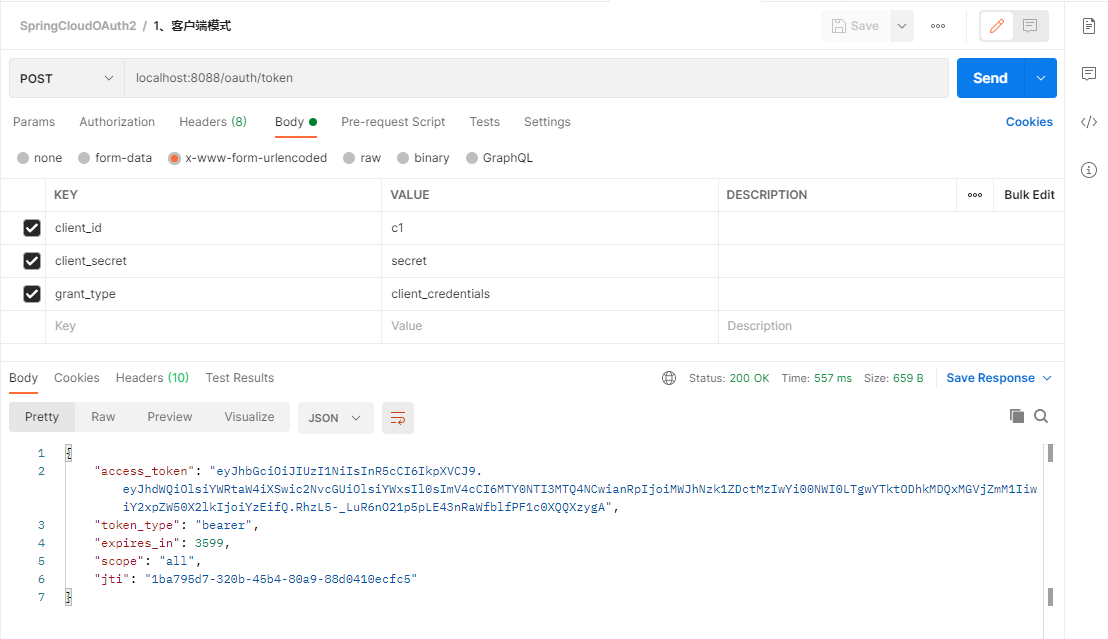
验证令牌:
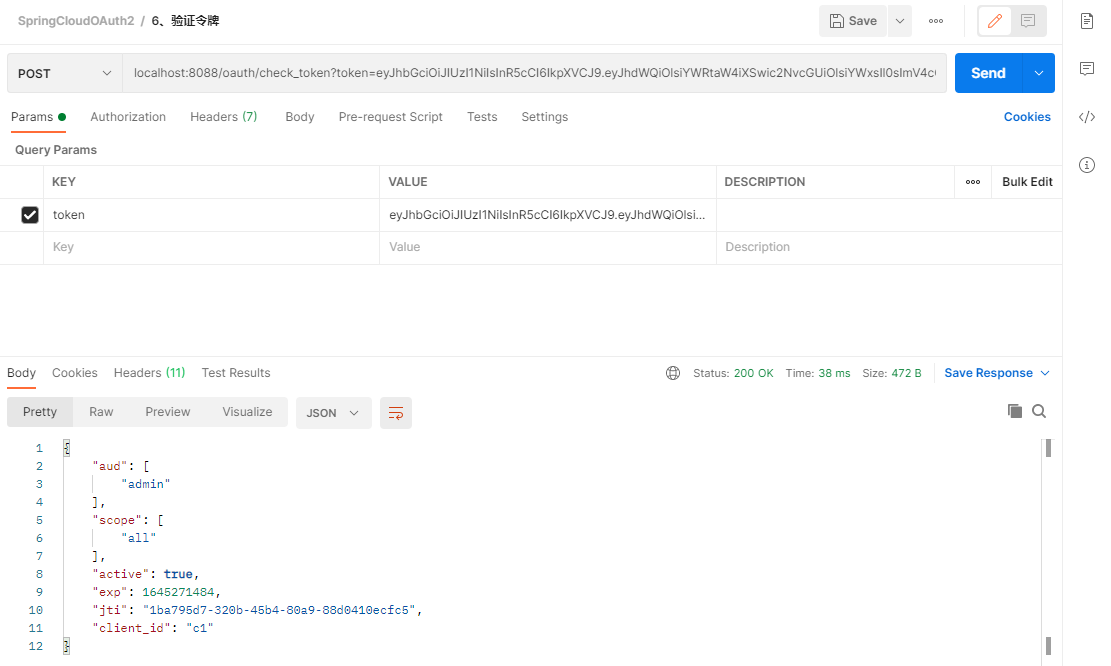
3. 资源服务器配置
- 将授权服务器中的TokenConfig拷贝至资源服务器config目录下
- 在ResourceServerConfig中屏蔽ResourceServerTokenServices
package com.sw.oauth.user.config;
import org.springframework.beans.factory.annotation.Autowired;
import org.springframework.context.annotation.Configuration;
import org.springframework.security.config.annotation.web.builders.HttpSecurity;
import org.springframework.security.config.http.SessionCreationPolicy;
import org.springframework.security.oauth2.config.annotation.web.configuration.ResourceServerConfigurerAdapter;
import org.springframework.security.oauth2.config.annotation.web.configurers.ResourceServerSecurityConfigurer;
import org.springframework.security.oauth2.provider.token.RemoteTokenServices;
import org.springframework.security.oauth2.provider.token.ResourceServerTokenServices;
import org.springframework.security.oauth2.provider.token.TokenStore;
/**
* @author suaxi
* @date 2022/2/15 22:36
*/
@Configuration
public class ResourceServerConfig extends ResourceServerConfigurerAdapter {
private static final String RESOURCE_ADMIN = "admin";
@Autowired
private TokenStore tokenStore;
@Override
public void configure(ResourceServerSecurityConfigurer resources) throws Exception {
resources
//资源ID
.resourceId(RESOURCE_ADMIN)
//使用远程服务验证令牌(使用JWT令牌时无需远程验证服务)
// .tokenServices(tokenServices())
.tokenStore(tokenStore)
//无状态模式(无需管理session,此处只验证access_token)
.stateless(true);
}
@Override
public void configure(HttpSecurity http) throws Exception {
http.authorizeRequests()
.antMatchers("/admin/**")
.access("#oauth2.hasAnyScope('all')")
.and()
.csrf().disable()
.sessionManagement().sessionCreationPolicy(SessionCreationPolicy.STATELESS);
}
/**
* access_token远程验证策略
* @return
*/
// public ResourceServerTokenServices tokenServices() {
// RemoteTokenServices tokenServices = new RemoteTokenServices();
// tokenServices.setCheckTokenEndpointUrl("http://localhost:8088/oauth/check_token");
// tokenServices.setClientId("c1");
// tokenServices.setClientSecret("secret");
// return tokenServices;
// }
}
4. 测试
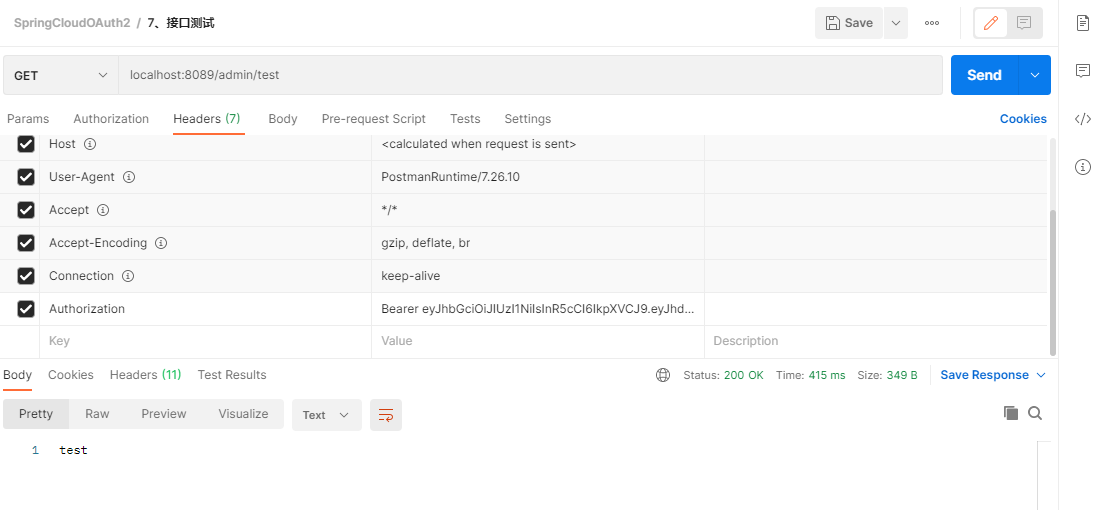
Github demo地址:https://github.com/suaxi/Spring-Cloud-OAuth2





评论 (0)